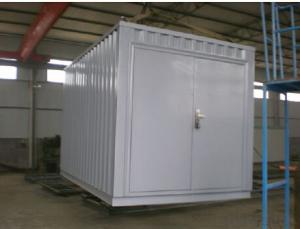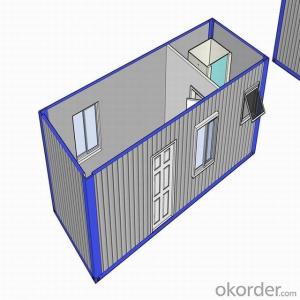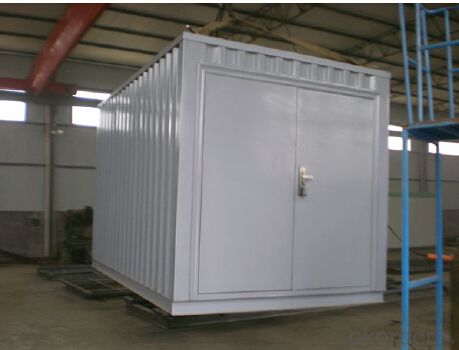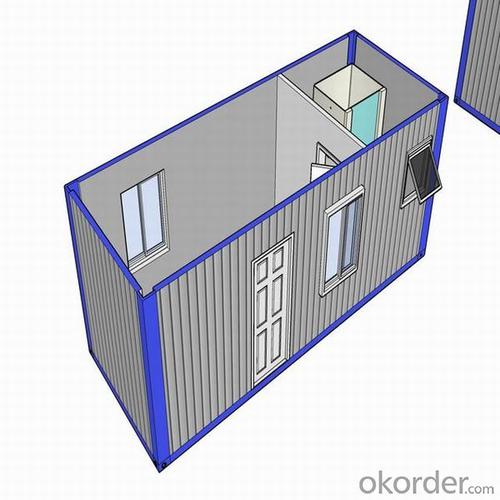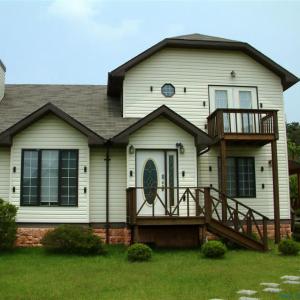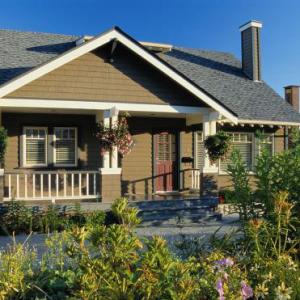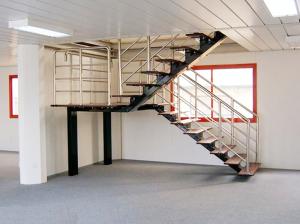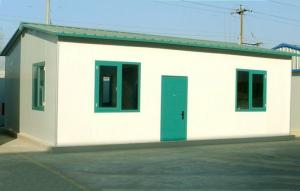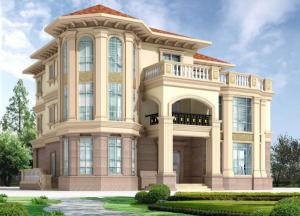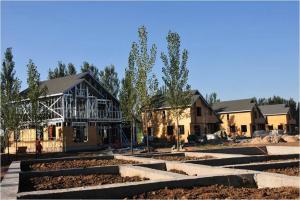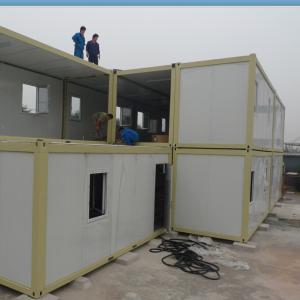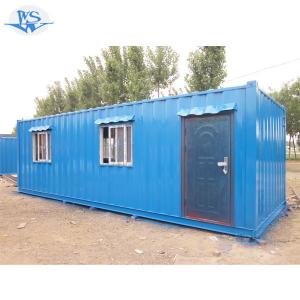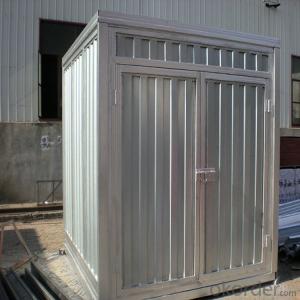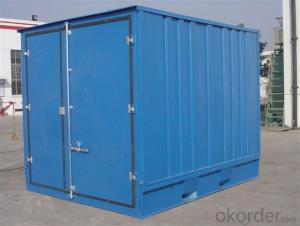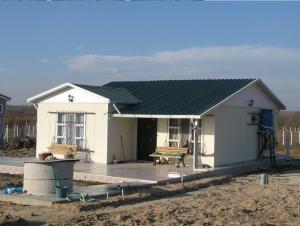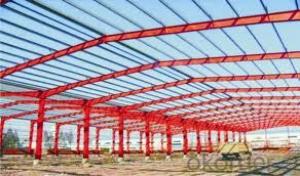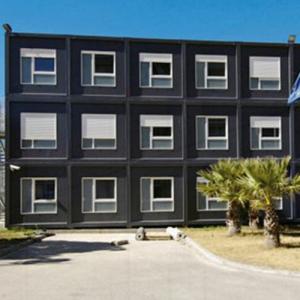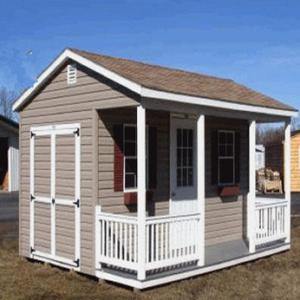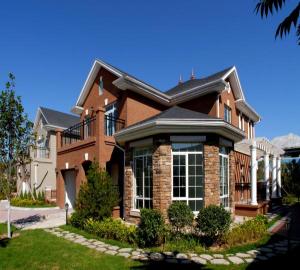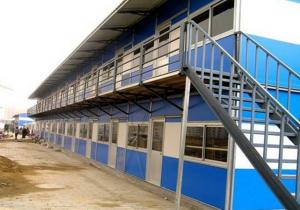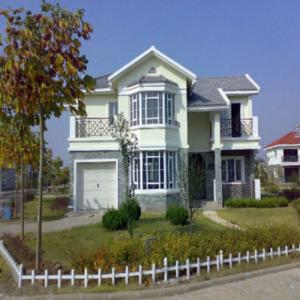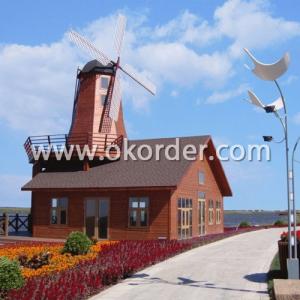Galvanzied Steel Storage Prefabricated House Made in China
- Loading Port:
- Tianjin
- Payment Terms:
- TT OR LC
- Min Order Qty:
- 6 m²
- Supply Capability:
- 50000 m²/month
OKorder Service Pledge
OKorder Financial Service
You Might Also Like
Galvanzied Steel Storage Prefabricated House Made in China
Description:
1. The house is made of light steel structure and rustproof color steel sandwich panel as wall and roof.
2. The size and layout can be designed as per customers' requirements for its flexible dimension
3. The house has waterproof structure and heating insulation material, such as EPS, Rock wool or PU Panels interlock easily to form a complete thermally efficient shell.
4. Two kinds of flooring system are available, one is steel chassis floor, the other is concrete foundation.
5. One 40’HQ container can load about 160m2 considering 75mm thickness panel for roof and wall;
6. Six skilled workers can finish 42m2 in 8 hours ;
7. The house can resist heavy wind load of 0.5KN/m2 and 7-8 degree seismic intensity.
8. DimensionAs per customer design or layoutLoading160 to 200m2 per 40’HQ container
Applications:
Family house for low income people, Temporary homes for disaster area, Holiday and vocation house…Remote site constructions camping, Warehouse , Work shop…Company office, Dining halls, Dormitories, Hospitals, Saloons, Entertainment centers…
FAQ:
1.How about the installation? For example, the time and cost?
To install 200sqm house needs only 45 days by 6 professional workers. The salary of enginner is USD150/day, and for workers, it's 100/day.
2.How long is the life span of the house?
Around 50 years
3. And what about the loading quantity?
One 40'container can load 140sqm of house.
Images:
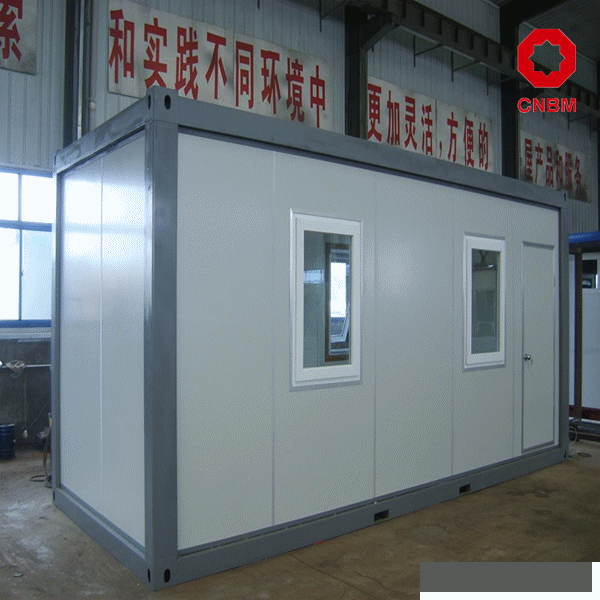
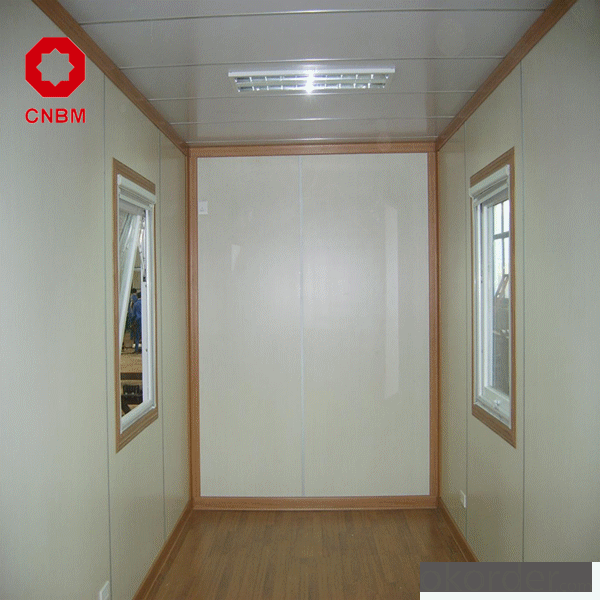
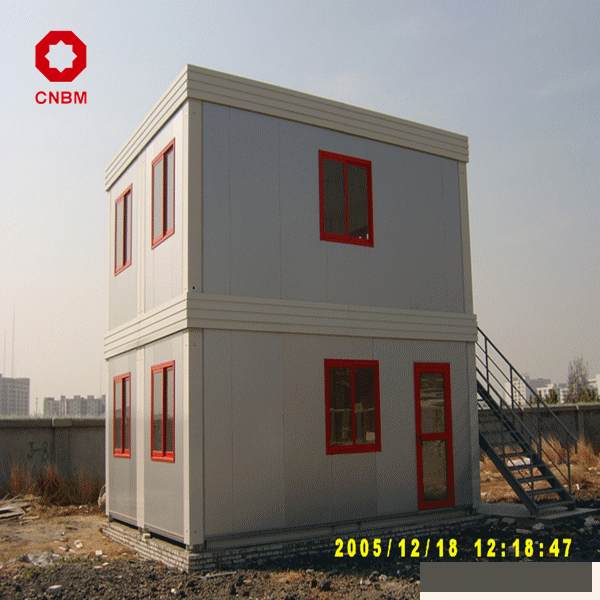
- Q: Are container houses resistant to earthquakes or seismic activity?
- Yes, container houses can be designed and built to be resistant to earthquakes or seismic activity. By reinforcing the structure and foundation, using flexible materials, and implementing proper engineering techniques, container houses can withstand seismic forces and minimize damage during earthquakes.
- Q: Do container houses require planning permission?
- In most cases, container houses do require planning permission. The regulations regarding planning permission for container houses vary depending on the location and local building codes. While some areas may have more lenient rules, many jurisdictions treat container houses as permanent structures and subject them to the same planning permission requirements as traditional houses. This means that obtaining planning permission is necessary before installing a container house on a specific site. It is crucial to consult with local authorities or a professional architect to understand the specific regulations and requirements in your area. By doing so, you can ensure that you comply with all necessary permissions and avoid any potential legal issues in the future.
- Q: Are container houses suitable for homeless shelters or transitional housing?
- Yes, container houses can be suitable for homeless shelters or transitional housing. They are cost-effective, easy to transport, and can be quickly assembled. Container houses also provide a secure and comfortable living space, offering an opportunity for individuals to transition out of homelessness into more stable housing.
- Q: Are container houses suitable for military or temporary base housing?
- It is true that container houses can be a suitable option for military or temporary base housing. There are several advantages that make them a viable choice for such purposes. To begin with, container houses are incredibly durable and sturdy. They are specifically designed to withstand even the harshest weather conditions, making them ideal for military bases that may be situated in challenging environments. Moreover, they are constructed to be resistant to fire and other potential hazards, ensuring the safety of military personnel. Furthermore, container houses offer the benefit of being portable and easy to transport. They can be swiftly and efficiently moved from one place to another, which is especially advantageous for temporary base housing. This flexibility allows military bases to adapt to changing circumstances and relocate housing units as needed. In addition, container houses are cost-effective. They are considerably more affordable than conventional construction methods, enabling military organizations to save on construction and maintenance expenses. This cost-effectiveness is particularly crucial for temporary bases, where budgetary constraints are often a concern. Moreover, container houses can be customized and modified to meet specific requirements. They can be easily expanded or interconnected to create larger living spaces, accommodating varying numbers of personnel. Additionally, they can be equipped with essential amenities such as heating, cooling, plumbing, and electrical systems, ensuring that military personnel have all the necessary comforts. Lastly, container houses are environmentally friendly. By repurposing shipping containers, we can reduce waste and promote sustainability. They can be designed to be energy-efficient, incorporating insulation and renewable energy sources, further reducing their carbon footprint. In conclusion, container houses are a suitable choice for military or temporary base housing due to their durability, portability, cost-effectiveness, customizability, and environmental friendliness. They provide a practical and efficient solution for accommodating military personnel in diverse locations and situations.
- Q: Are container houses suitable for temporary housing?
- Yes, container houses are suitable for temporary housing. Container houses are an innovative and cost-effective solution for temporary housing needs. They are built using repurposed shipping containers, which are durable, portable, and readily available. Container houses offer several advantages for temporary housing. Firstly, they can be quickly and easily assembled, making them ideal for emergency situations or areas with urgent housing needs. The containers can be transported and set up on-site in a short time frame, allowing for swift accommodation of displaced individuals or communities. Additionally, container houses are customizable and can be designed to meet specific requirements. They can be equipped with basic amenities such as insulation, electricity, plumbing, and heating/cooling systems, ensuring a comfortable living environment. Furthermore, containers can be stacked or arranged in various configurations to create larger living spaces or accommodate multiple families. Another advantage of container houses is their affordability. Shipping containers are relatively inexpensive compared to traditional building materials, making them a cost-effective solution for temporary housing projects. Moreover, the use of repurposed containers is environmentally friendly, as it reduces waste and promotes recycling. Container houses also have the advantage of mobility. They can be easily relocated to different sites, allowing for flexibility in responding to changing needs or situations. This is particularly beneficial for temporary housing projects that require mobility, such as disaster relief efforts or construction site accommodations. In conclusion, container houses are highly suitable for temporary housing. Their durability, portability, customization options, affordability, and mobility make them an excellent choice for emergency housing, disaster relief, construction site accommodations, and other temporary housing needs.
- Q: Can container houses be designed with a built-in storage system?
- Certainly, it is entirely possible to design container houses with an integrated storage system. Indeed, one of the benefits of utilizing shipping containers for housing lies in their inherent storage capacity. The containers' large and robust structure permits the implementation of imaginative and efficient storage solutions. Designers and architects have the ability to include a variety of storage options within container homes, such as inbuilt shelves, cabinets, and closets. These storage systems can be tailored to suit the specific requirements and preferences of the homeowner. By employing wall-mounted storage units or constructing built-in loft spaces, the vertical space within the containers can be maximized. Furthermore, container houses can also boast innovative storage solutions that cleverly utilize the unique characteristics of the containers. For instance, certain designs incorporate sliding panels or concealed compartments within the walls or floors of the containers, providing additional storage space without compromising the aesthetic appeal of the home. All in all, container houses offer immense potential for integrating a built-in storage system, enabling homeowners to optimize the available space and maintain a neat and organized living environment.
- Q: Are container houses suitable for remote or secluded living?
- Yes, container houses are suitable for remote or secluded living. They are designed to be durable, portable, and able to withstand harsh weather conditions. Additionally, container houses can be easily transported to remote locations, making them ideal for those seeking an off-grid lifestyle or temporary living arrangements in secluded areas.
- Q: Are container houses suitable for areas with limited access to construction materials?
- Container houses are a great option for areas where construction materials are hard to come by. These houses are made from shipping containers, which are easy to find and can be transported to even remote locations. Using these containers as a foundation creates a sturdy and durable base for building a house, making them perfect for areas with limited access to traditional construction materials. Another advantage is that container houses can be easily customized and adjusted to suit the specific needs and climate of the area. They can also be designed to be self-sufficient, with renewable energy sources and water collection systems, reducing the need for external materials and resources. In conclusion, container houses offer a practical and sustainable housing solution for areas with limited construction materials, providing a fast, cost-effective, and eco-friendly option.
- Q: Villa (self-built buildings) feng shui to pay attention to what?
- As the saying goes, one fight two life three feng shui. Rural construction are stress "feng shui". Now introduce some of the folk feng shui related to the building.
- Q: Are container houses suitable for tiny homes?
- Tiny homes can indeed be suitable for container houses. These homes, also referred to as shipping container homes, are increasingly being used as a cost-effective and sustainable alternative. They are constructed from recycled shipping containers that are strong, durable, and easily obtainable. Container houses boast several advantages for tiny homes. Firstly, they are highly customizable and can be tailored to meet specific preferences and requirements. By modifying and combining containers in various ways, one can create a distinctive and functional living space. Additionally, container homes can be easily expanded or reduced in size by adding or removing containers as needed, allowing for flexibility in response to changing needs. Furthermore, container houses are a cost-effective option. When compared to traditional construction methods, building a container home can be significantly cheaper. The cost of purchasing and modifying containers tends to be lower than that of constructing a conventional house, making container homes an appealing choice for individuals on a limited budget. Moreover, container homes are energy-efficient and environmentally friendly. By repurposing shipping containers, waste is reduced, and the use of new materials is minimized. In terms of livability, container houses can provide comfortable and functional living spaces. With proper insulation, ventilation, and interior design, container homes can offer a cozy and visually pleasing environment. The compact size of containers is well-suited for tiny homes, as it encourages a minimalistic lifestyle and efficient utilization of space. However, it is important to take into consideration the limitations of container houses for tiny homes. One significant challenge is the need for insulation to regulate temperature and prevent condensation. Proper insulation is crucial in maintaining a comfortable indoor environment, particularly in extreme climates. Additionally, the narrow width of shipping containers may necessitate innovative interior design solutions to maximize space utilization. All in all, container houses are a suitable option for tiny homes, providing affordability, sustainability, and versatility. With careful planning and design considerations, container homes can offer a comfortable and stylish living space while promoting a minimalist and eco-friendly lifestyle.
Send your message to us
Galvanzied Steel Storage Prefabricated House Made in China
- Loading Port:
- Tianjin
- Payment Terms:
- TT OR LC
- Min Order Qty:
- 6 m²
- Supply Capability:
- 50000 m²/month
OKorder Service Pledge
OKorder Financial Service
Similar products
Hot products
Hot Searches
